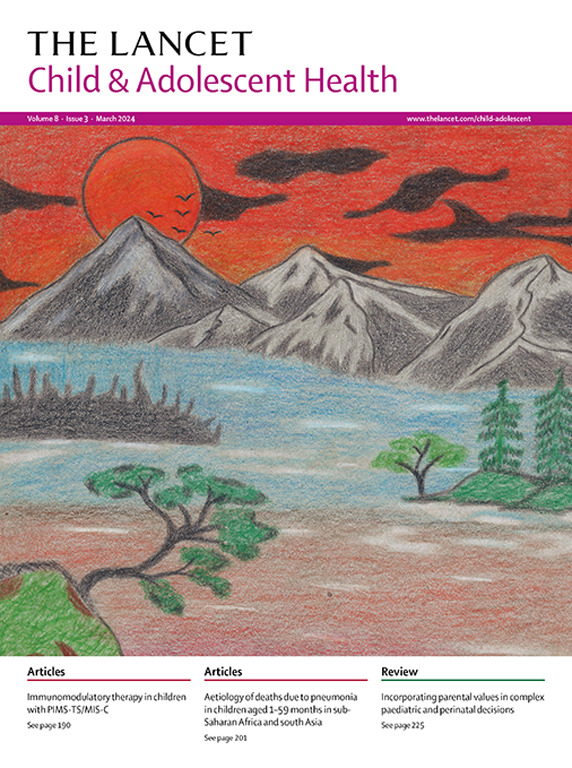Longer-term survival, quality of life, and cost-effectiveness of conservative versus liberal oxygenation targets in critically ill children: a pre-specified analysis from Oxy-PICU, a multicentre, open, parallel-group, randomised controlled trial
IF 19.9
1区 医学
Q1 PEDIATRICS
引用次数: 0
Abstract
Background
Peripheral oxygen saturation (SpO2) above 94% is typical in children in paediatric intensive critical care units (PICUs) who are receiving invasive ventilation and supplemental oxygen. In a previous report from the Oxy-PICU trial, we showed that lower (conservative) oxygenation targets (SpO2 88–92%) are beneficial, showing small but statistically significant differences in duration of organ support and large but non-significant cost reductions at 30 days. In this pre-specified analysis of the Oxy-PICU trial, we compare longer-term outcomes and cost-effectiveness of conservative versus liberal (SpO2 >94%) oxygenation targets in children with emergency PICU admission.
Methods
Oxy-PICU was a pragmatic, multicentre, open-label, randomised controlled trial in England and Scotland. Eligible children were older than 38 weeks and younger than 16 years and had been admitted for emergency care in one of 15 participating PICUs, where they received invasive respiratory support for abnormal gas exchange. Participants were randomly assigned (1:1) to either a conservative oxygenation target (SpO2 88–92%) or liberal oxygenation target (SpO2 >94%). Survival status was assessed at 90 days and 1 year, and health-related quality of life (HRQoL), quality-adjusted life-years (QALYs), health-care costs, and incremental net monetary benefit were assessed at 1 year after the index hospital admission and randomisation. HRQoL was measured with age-appropriate Paediatric Quality of Life Generic Core Scales and mapped onto the Child Health Utility 9D index score. HRQoL and survival data were combined to construct QALYs. Costs at 1 year were derived from use of hospital, outpatient, and community health services. The trial was registered in the ISRCTN registry (ISRCTN92103439).
Findings
2040 children were enrolled between Sept 1, 2020 and May 15, 2022. 1868 (91·6%) children were included in the 90-day survival analysis; of these 930 (49·8%) had been assigned liberal oxygen and 938 (50·2%) conservative oxygen. 1867 (91·5%) children were included in the 1-year survival analysis; 930 (49·8%) had been assigned liberal oxygenation and 937 (50·2%) conservative oxygen. At 90 days, 35 (3·7%) patients in the conservative oxygenation group and 45 (4·8%) patients in the liberal oxygenation group had died (adjusted hazard ratio [aHR] 0·75 [95% CI 0·48 to 1·17]). By 1 year, 52 (5·5%) patients in the conservative oxygenation group and 66 (7·1%) patients in the liberal oxygenation group had died (aHR 0·77 [95%CI 0·53 to 1·10]). Overall, mean HRQoL, life-years, and QALYs at 1 year were similar in the two groups. The adjusted incremental effect on cost of conservative oxygenation versus liberal oxygenation was –£879 (95% CI –9036 to 7278), whereas the incremental difference in QALYs was estimated at 0·001 (–0·010 to 0·011), leading to an incremental net monetary benefit of £894 (–7290 to 9078) associated with conservative oxygenation relative to liberal oxygenation. These results did not vary by age (<12 months vs ≥12 months), comorbidity at baseline, age-adjusted heart rate, or haemoglobin level at admission and were robust to alternative assumptions.
Interpretation
Compared with usual care (SpO2 >94%) for invasively ventilated children who are admitted as an emergency to a PICU, conservative oxygenation (SpO2 88–92%) was not associated with differences in longer-term survival, costs, or cost-effectiveness. Taken together with previous findings of Oxy-PICU that conservative oxygenation compared with liberal oxygenation leads to better patient-centred and parent-centred outcomes at 30 days, these findings support the use of conservative oxygenation targets for this population.
Funding
UK National Institute for Health and Social Care Research Health Technology Assessment Programme.
危重儿童保守氧合与自由氧合目标的长期生存、生活质量和成本效益:一项多中心、开放、平行组、随机对照试验Oxy-PICU的预先指定分析。
背景:外周氧饱和度(SpO2)高于94%是儿科重症监护病房(picu)接受有创通气和补充氧气的儿童的典型特征。在之前的一份氧合- picu试验报告中,我们发现较低的(保守的)氧合目标(SpO2 88-92%)是有益的,在器官支持持续时间上显示出微小但具有统计学意义的差异,在30天内显示出巨大但不显著的成本降低。在这项预先指定的氧合-PICU试验分析中,我们比较了急诊PICU入院儿童保守与自由氧合目标(SpO2 bb0 94%)的长期结果和成本效益。方法:Oxy-PICU是一项实用、多中心、开放标签、随机对照试验,在英格兰和苏格兰进行。符合条件的儿童年龄大于38周,小于16岁,在15个picu中的一个接受紧急护理,在那里他们因异常气体交换接受有创呼吸支持。参与者被随机分配(1:1)到保守氧合目标(SpO2 88-92%)或自由氧合目标(SpO2 bb0 94%)。在90天和1年时评估生存状态,在指标入院和随机化后1年评估健康相关生活质量(HRQoL)、质量调整生命年(QALYs)、医疗保健成本和增量净货币收益。HRQoL采用与年龄相适应的儿科生活质量通用核心量表进行测量,并映射到儿童健康实用工具9D指数得分。结合HRQoL和生存数据构建qaly。1年的费用来源于医院、门诊和社区卫生服务的使用。该试验在ISRCTN注册中心注册(ISRCTN92103439)。研究结果:2040名儿童在2020年9月1日至2022年5月15日期间入组。1868例(91.6%)儿童被纳入90天生存分析;其中930例(49.8%)给予自由氧,938例(50.2%)给予保守氧。1867例(91.5%)儿童纳入1年生存分析;930例(49.8%)给予自由氧供,937例(50.2%)给予保守氧供。90 d时,保守氧合组35例(3.7%)死亡,自由氧合组45例(4.8%)死亡(校正风险比[aHR] 0.75 [95% CI 0.48 ~ 1.17])。1年时,保守氧合组死亡52例(5.5%),自由氧合组死亡66例(7.1%)(aHR 0.77 [95%CI 0.53 ~ 1.10])。总体而言,两组的平均HRQoL、生命年和1年时的QALYs相似。保守氧合与自由氧合的调整后的成本增量效应为- 879英镑(95% CI -9036至7278),而QALYs的增量差异估计为0.001(- 0.010至0.011),导致保守氧合相对于自由氧合的净货币效益增量为894英镑(-7290至9078)。这些结果没有因年龄而变化(解释:与常规护理相比,急诊入PICU的有创通气儿童的SpO2(0.94%),保守氧合(SpO2 88-92%)与长期生存、成本或成本效益的差异无关。结合先前的Oxy-PICU研究结果,保守氧合与自由氧合相比,在30天内以患者为中心和以家长为中心的结果更好,这些发现支持在这一人群中使用保守氧合目标。资助:英国国家卫生和社会保健研究所卫生技术评估方案。
本文章由计算机程序翻译,如有差异,请以英文原文为准。
求助全文
约1分钟内获得全文
求助全文
来源期刊

Lancet Child & Adolescent Health
Psychology-Developmental and Educational Psychology
CiteScore
40.90
自引率
0.80%
发文量
381
期刊介绍:
The Lancet Child & Adolescent Health, an independent journal with a global perspective and strong clinical focus, presents influential original research, authoritative reviews, and insightful opinion pieces to promote the health of children from fetal development through young adulthood.
This journal invite submissions that will directly impact clinical practice or child health across the disciplines of general paediatrics, adolescent medicine, or child development, and across all paediatric subspecialties including (but not limited to) allergy and immunology, cardiology, critical care, endocrinology, fetal and neonatal medicine, gastroenterology, haematology, hepatology and nutrition, infectious diseases, neurology, oncology, psychiatry, respiratory medicine, and surgery.
Content includes articles, reviews, viewpoints, clinical pictures, comments, and correspondence, along with series and commissions aimed at driving positive change in clinical practice and health policy in child and adolescent health.
 求助内容:
求助内容: 应助结果提醒方式:
应助结果提醒方式:


